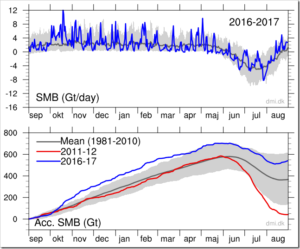by Samuele Furfari, 31 août 2017
Dans la lutte que mènent nos villes contre la pollution urbaine, on perçoit la recherche désespérée de solutions alternatives aux véhicules conventionnels. C’est le cas en particulier pour les particules fines, même s’il est de bon ton de passer sous silence que le chauffage contribue aussi largement à cette pollution….
by Paul Homewood, August 31,2017 in NotaLotofPeopleKnowThat
Greenland’s melt season ended a month ago, and since last September the ice sheet has grown at close to record rate.

Graph from here
See here and also here
by University of Chicago Press Journals, August 30, 2017 in ScienceDaily
To date, about 1.5 million species have been formally described in the scientific literature, most of them insects. Proportionally, bacteria comprise less than 1% of all described species.
…
In a new paper published in The Quarterly Review of Biology (September 2017), researchers from the University of Arizona have estimated that there are roughly 2 billion living species on Earth, over a thousand times more than the current number of described species.
by Haijun Song et al., August 2017, in Nature
Banded iron formations were a prevalent feature of marine sedimentation ~3.8–1.8 billion years ago and they provide key evidence for ferruginous oceans. The disappearance of banded iron formations at ~1.8 billion years ago was traditionally taken as evidence for the demise of ferruginous oceans, but recent geochemical studies show that ferruginous conditions persisted throughout the later Precambrian, and were even a feature of Phanerozoic ocean anoxic events.
by ‘Small-M’ blog, March 2007
Currently (as of year 2007), human population on earth is 6.6 billion (via wikipedia). I went around to look for how much CO2 is exhaled out per person, and 2 claims were found (both via wikipedia)
by J. Sanderman et al., July 2017 in PNAS
Human appropriation of land for agriculture has greatly altered the terrestrial carbon balance, creating a large but uncertain car- bon debt in soils. Estimating the size and spatial distribution of soil organic carbon (SOC) loss due to land use and land cover change has been difficult but is a critical step in understand- ing whether SOC sequestration can be an effective climate mitigation strategy.
See also here
by Marcus Gutjah et al., August 30, 2017 in PhysOrg
A natural global warming event that took place 56 million years ago was triggered almost entirely by volcanic eruptions that occurred as Greenland separated from Europe during the opening of the North Atlantic Ocean,
…
The amount of carbon released during this time was vast—more than 30 times larger than all the fossil fuels burned to date and equivalent to all the current conventional and unconventional fossil fuel reserves we could feasibly ever extract.” Ridgwell said.
An unexpected finding was that enhanced organic matter burial was important in ultimately sequestering the released carbon and accelerating the recovery of the Earth’s ecosystem without massive extinctions.
See also here
La géologie, une science plus que passionnante … et diverse

